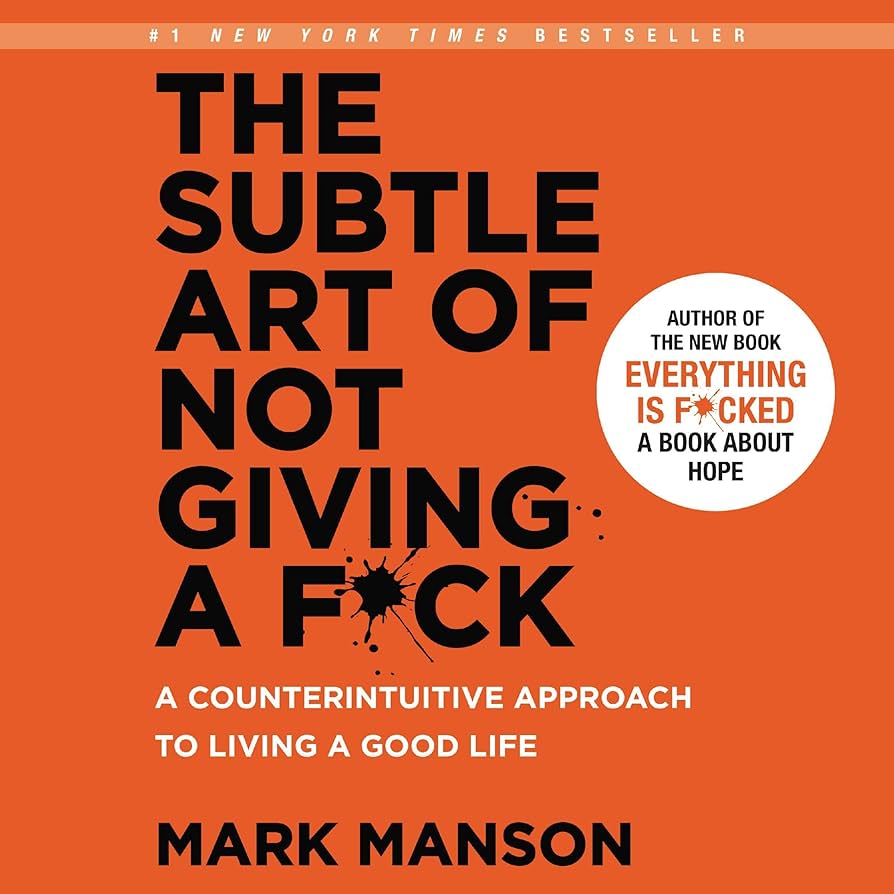Summary of "The Subtle Art of Not Giving a F*ck"

Core Premise
Mark Manson's "The Subtle Art of Not Giving a F*ck" presents a counterintuitive approach to living a good life. Rather than pursuing positivity at all costs, Manson argues that we should embrace our limitations, uncertainties, and failures. The book challenges the modern self-help industry's focus on relentless optimism and instead advocates for a more grounded approach to life's problems.
Key Concepts
1. The Feedback Loop from Hell
We often feel bad about feeling bad, creating a destructive cycle of negative emotions. When we feel anxious, we become anxious about being anxious. When we feel angry, we feel guilty about being angry. The solution is not to pursue more positive experiences but to accept negative ones as part of life.
Example: When you feel socially anxious at a party, you might then feel anxious about being anxious, creating additional suffering. The solution isn't to force yourself to feel confident, but to accept the anxiety: "I feel anxious right now, and that's okay."
2. Happiness is a Problem
Happiness comes from solving problems, not avoiding them. The constant pursuit of happiness as a destination is misguided. Instead, happiness emerges from engaging with life's struggles and challenges in meaningful ways.
Example: Someone training for a marathon experiences physical pain, exhaustion, and countless challenges. Yet completing the marathon and the process of training itself brings deeper satisfaction than temporary pleasures like eating junk food or playing video games.
3. You Are Not Special
The belief that we're extraordinary or uniquely terrible creates entitlement. Both forms of entitlement—believing you deserve special treatment because you're superior or because you're a victim—prevent personal growth and meaningful connections.
Example: The "Jimmy" character from the book who constantly talks about his brilliant business ideas but never follows through, believing his intelligence makes him exceptional despite his lack of accomplishments. This entitlement prevents him from putting in the work required for actual success.
4. The Value of Suffering
Not all suffering is equal. The quality of our lives depends on the quality of the problems we choose to solve. We should focus on suffering for things that align with our deepest values.
Example: Dave Mustaine achieved incredible success after being kicked out of Metallica by forming Megadeth (which sold over 25 million albums), yet still felt like a failure because he measured himself against Metallica's even greater success. Meanwhile, Pete Best, who was kicked out of the Beatles, eventually found happiness by prioritizing family values over fame.
5. You Are Always Choosing
We are always responsible for our experiences, even when events happen outside our control. While we may not control what happens to us, we control how we interpret and respond to events.
Example: After going through a painful breakup, you can't control your ex's behavior, but you can control whether you wallow in self-pity, obsess over revenge, or use the experience as an opportunity for self-improvement and growth.
6. You're Wrong About Everything
Growth requires constantly questioning your beliefs and assumptions. Being wrong isn't a failure; it's the pathway to knowledge and improvement.
Example: When a person assumes they're being rejected for a job because of discrimination rather than considering their qualifications or interview performance, they miss an opportunity for improvement. By questioning their assumption ("What if I'm wrong about why I was rejected?"), they open themselves to growth.
7. Failure is the Way Forward
Success comes through willingness to fail repeatedly. Action is both the cause and effect of motivation—taking action creates motivation, which leads to more action.
Example: Manson's "do something" principle: When struggling to write, force yourself to write just 200 words. Often, this small action generates motivation, and you end up writing much more than you initially intended.
8. The Importance of Saying No
Rejecting alternatives is necessary for commitment to meaningful values. Healthy relationships require strong boundaries and the ability to both say and hear "no."
Example: The difference between a toxic and healthy relationship often comes down to boundaries. In a healthy relationship, each person takes responsibility for their own emotions and problems, supporting each other without trying to "fix" one another.
9. ...And Then You Die
Contemplating mortality helps us maintain perspective on what truly matters. Only by acknowledging our limited time can we choose meaningful values and not waste energy on trivial concerns.
Example: Manson describes sitting on the edge of a cliff at South Africa's Cape of Good Hope, confronting his mortality directly. This experience helped him realize how many of his daily anxieties and concerns were ultimately meaningless when viewed against the certainty of death.
The Subtle Art in Practice
Better Values to Focus On
- Responsibility - Taking ownership of your problems, even when they're not your fault
- Uncertainty - Embracing doubt and questioning your beliefs
- Failure - Seeing failure as a necessary step toward improvement
- Rejection - Understanding that saying no and receiving rejection are crucial for healthy relationships
- Contemplation of mortality - Using awareness of death to prioritize what truly matters
Practical Applications
- Ask "What am I willing to struggle for?" rather than "What do I want?"
- Practice discomfort by deliberately facing fears and uncertainties
- Question your certainties regularly (What if I'm wrong about this?)
- Establish clear boundaries in relationships
- Focus on process-oriented values (honesty, vulnerability, creativity) rather than outcome-oriented values (wealth, fame, beauty)
Conclusion
The subtle art isn't about not caring about anything. It's about caring deeply about a select few things that truly matter while letting go of the rest. By accepting our limitations, embracing uncertainty, taking responsibility, and focusing on meaningful values, we can live more fulfilling lives even in the face of inevitable suffering. The key is not to eliminate problems but to choose better problems—ones that are worth the struggle they entail.